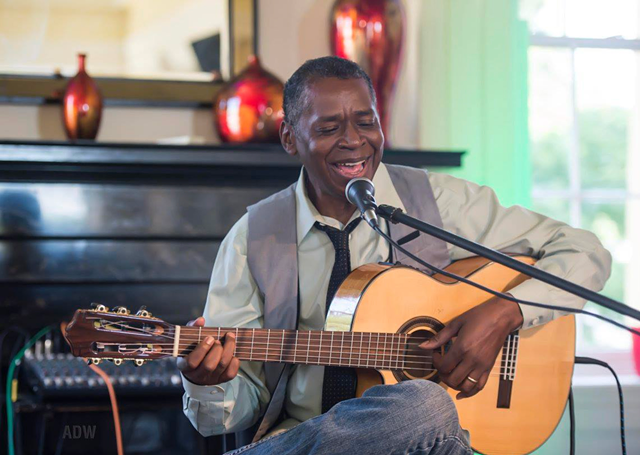
- PHOTO BY AARON WINTERS
- Miché Fambro performs at the Tango Cafe.
An Anglos show had it all: shenanigans, lights, and catchy songs. But most of all, there was Miché Fambro, the lead singer, lead guitarist, and charisma incarnate, who died in December of cancer at the age of 64.
I was sure they’d be big, successful by every measure.
Many years later, I got to know the strange, warm, and thoughtful Fambro. He went by Mick. Where’d “Miché” come from? Mick said he’d spelled “Micky” that way on a lark, someone pronounced it “me-SHAY,” and the rest became history.
Clifton Michael Fambro was born on Nov. 6, 1956, and raised with his siblings in West Philadelphia without much. His mother, Vivian McCord, says, “When Mick was a baby, he was quiet . . . when he was a little boy, he was quiet . . . when he was a young man, he was quiet.”
Mick’s theoretical grasp of music was staggering, and he could articulate it thoroughly. But he was self-taught, “in life as well as music,” as his wife, Wendy, says. A pair of grandparents had been Vaudeville performers, but they actively discouraged his interest in music. Their experience being exploited had made them cynical about the entertainment business. He started with drums, but when Mick saw a guitar in a pawn shop window, he was off and running, preferring the company of his guitar to most social interaction.
He played the guitar upside-down and left-handed. At art camp, an instructor insisted he turn the guitar over and play it properly. Mick already knew how to play one song his way and refused. That was that for lessons.
An early influence for him was Sid Mark’s “Friday with Frank” radio program out of Philadelphia, featuring the music of Frank Sinatra. Mick would forever love Sinatra, and find further inspiration in Hugh Masekela, the Philly sound, Motown, and the band, Chicago.
He eventually “lied his way into a hotel band” touring the Holiday Inns of America, Wendy says. It was awful, and on a stop in Geneseo, he decided to stay. He found work at Buzzo’s music shop and with his first band, The Deserters. That band became legendary with a certain slice of Rochester and led to Miché and the Anglos.
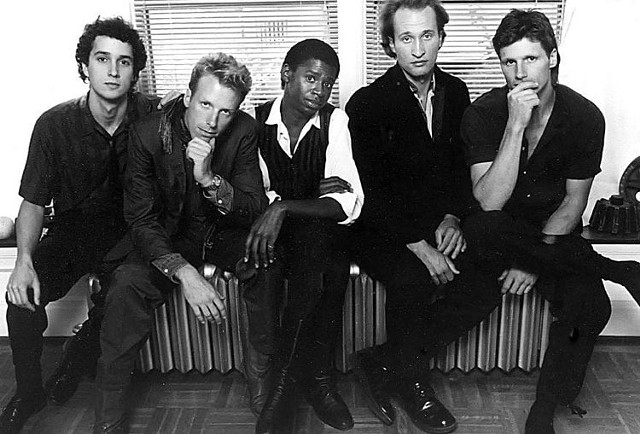
- PHOTO PROVIDED
- Miché and the Anglos, circa 1980.
“‘Successful’ is kind of a slippery slope,” Anglos drummer Jim Conner says.
He tells the story of the band’s origins this way: “Well, Freddie (Anglos guitarist Fred Kentner) and I had seen The Deserters, and we were just really taken with this kid.” The “kid” was Mick.
Conner and Kentner tracked him down at Buzzo’s and convinced him to jam with him in Conner’s mother’s basement. “Maybe he liked that we weren’t selling anything,” Conners says.
They played for hours, and two weeks later opened a show at Scorgie’s. The momentum built from there. The initial spontaneity and willingness to try anything was what drove them. “We couldn’t stop writing,” Conner recalls.
The band practiced two or three times a week and played to good crowds. “Getting shut down by the fire marshal, that kind of thing,” Conner says. “We tried to make it more than music, like a real show.”
There were brushes with “success”: Chuck Mangione’s lawyer wanting to sign them; Spyro Gyra inviting them over; an encouraging letter from Peter Gabriel. They tried many approaches to get to some “next level.”
There was no bitter breakup, maybe just a loss of energy and too many personnel changes. “Mick was always completely committed to this life, to being a professional musician,” Wendy says. “It was hard to get that same commitment from everyone.”
Fambro got sick for the first time. The bandmates all had children. Things changed.
“The most heartbreaking thing isn’t that we didn’t get big,” Conner says, “but that so many songs never saw the light of day.”
So Miché went solo with a new style and sound. He’d seen José Feliciano on TV and thought, “If that ugly old guy can make a living doing this by himself . . . .” But Miché on a nylon-string guitar was unique. He borrowed some Flamenco technique but added drumming on the body of the guitar. You could spot newbies in a Miché audience realize they’d never seen anyone play like that.
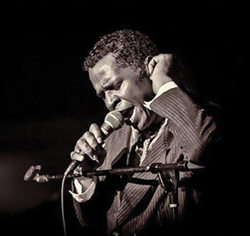
- PHOTO PROVIDED BY NELSON ONOFRE
About a year before he died, Mick agreed to perform at tribute to Richard Thompson at Abilene’s Bar and Lounge in Rochester, despite not knowing the English singer-songwriter’s work well. He asked me to suggest a song, and even though he needed a cheat sheet to get through the words, managed to bring the house down with his performance. At another local event, he turned Neil Young’s folksy “Sugar Mountain” into a Motown banger and had the audience on their feet. The man could light up a room.
“His idiosyncratic, yet highly natural way of playing acoustic guitar, his smooth, warm and silky voice that reminded me of Nat King Cole and Sinatra,” wrote promoter Augustin Wiedeman, who brought Miché to Germany for an international guitar festival. “The wit of his arrangements, his storytelling, his supernatural charisma — all added up to one of the most fascinating and underrated American musicians of the last decades.”
Wiedeman continues, “I had big plans. Miché would have played at some of Europe´s biggest guitar festivals. Like many great American jazz musicians, he would have found the fame and recognition he deserved in Europe. Story of the prophet in his own country.”
Why isn’t Miché Fambro a household name? Many industry types saw him and acknowledged his off-the-charts talent. A NYC club wanted him as a music manager. A Hollywood producer wanted him as a show host. But there wasn’t a section in the record store for his music. And Mick didn’t like being put in any box.
There’s a story in Mick’s career about how America treats artists; about jazz and its place in our culture, about the incredible fruits of the American melting pot.
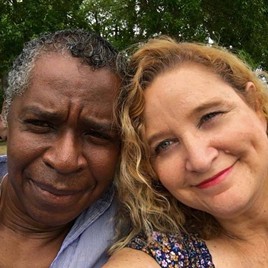
- PHOTO PROVIDED
- Miché and his wife Wendy.
But the couple encountered racism. “We learned early on that I should go alone at first to look at possible rentals,” she says. “And one time, I got a call that someone thought my car was stolen because it broke down and Mick was walking around it.” She recalls those stories without noticeable bitterness.
Their daughter, Michael, loves her interracial identity. “I always felt it was awesome,” she says, “like I was this nature-made bridge between.”
A couple of stage characters Mick developed over the years — psychedelic bluesman Alvin Ray and irascible jazz “great” Mo’gan Willems — show that issues of race were on his mind, however.
Scott Bradley, who played many gigs as Mick’s pianist, said, “I’ve worked with a lot of great Black musicians, but Mick taught me what whiteness is.” He means that Mick made him think.
“Mick and I,” Bradley went on, “would have debates that went something like this":
Mick: I’ve never thought of myself as a singer but rather as an actor. My character has to sing several numbers. Since I have confidence in my acting ability, I’m able to sing confidently.
Scott: So imagine this: your character is Muddy Waters, and you sing about how your “woman done left you,” then slay on guitar. Crowds will go wild!
Mick: No. I’d see this as selling out.
“I wanted him to cash in on being Black and he wasn’t having it,” Bradley says. “I apologized and we moved on.”
Perhaps race was a part of the “which box?” issue Miché had with The Business, but it wasn’t The Story.
“All we ever wanted for Mick,” Conner says, “was to be happy with who he was and what he’d done.”
Was he? I felt joy around Mick: in his work, around his family.
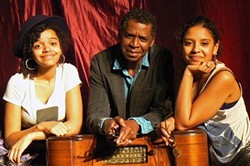
- PHOTO PROVIDED
- Miché with his daughters, Naomi Fambro, left, and Michael Fambro.
But, she quickly adds, her father never brought that discontent into his relationship with her or her sister, Naomi. “He was always so present with us, so interested and hopeful about what we were doing,” she says.
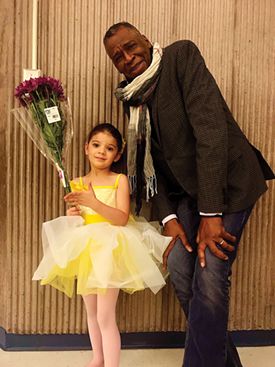
- PHOTO PROVIDED
- Miché with his granddaughter, Leona Swanson Fambro.
Michael Fambro is a writer, director, and actor, and she and her dad worked together on some of his theatrical ventures, like his variety show, “Miché Today.” They even wrote a musical, “The Dress Rehearsal,” when Michael was just 16. “Even my friends thought Dad was the coolest,” Michael says, laughing. “But he could be a little bit of a diva,” she remembers. “He was so used to being the boss.”
On “Miché Today,” a series of shows he staged that were a throwback to the old-fashioned variety show format, he was a crooning combo of Flip Wilson and Johnny Carson. Much effort went in, the return wasn’t great, and Mick could get salty when he didn’t like the situation. “One time at The Little Theatre, he stopped the show and told off the audience,” Bradley says. “It took a while to get paid.”
That outward frustration was an outlier, though. Those who knew him best recall Mick as sweet, a great listener, a wonderful human being. “Meeting him in person in Germany,” Wiedeman wrote, “I found he was one of the nicest and (most) loveable human beings that I have ever encountered.” Or this from Bradley, “If he’d been tone-deaf and completely untalented, I would have loved him.” Me, too.
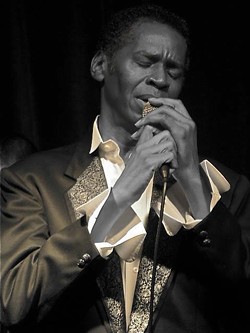
- PHOTO PROVIDED
He would take work where he could find it, and sometimes it was serendipitous.
“I got a call for a gig in Brooklyn,” Argentinian bassist Andres Rotmistrovsky remembers. “Miché was the singer and I was amazed. The next week, he played guitar and I was blown away.”
Rotmistrovsky introduced Mick to percussionist Marcelo Woloski, and the short-lived, but exceedingly excellent Forward Trio was born. They talked of tours, but two recording sessions and a couple of gigs were all that happened. The Forward Trio became another “not quite” among many.
Money never came easily. “That was hard on Mick,” Wendy says. “If I’d been the artist and he’d been the breadwinner, nobody would have batted an eye. But the gender thing makes that hard on men.” Mick’s life gave the lie to the notion that if you follow your passion and work hard, a living will follow. Wendy says they were jealous of how Canada supports its artists.
In 2016, Mick staged a retrospective around his 60th birthday. He played solo, with a version of the Anglos, and with a big band led by Bradley. Conner says they had vague plans to continue. Same with Bradley.
“But we wouldn’t see him,” Conner explained. “And then it would be like, ‘Oh, are you back from Sweden? How’s your health?’”
As Wendy puts it, “For 30 years doctors had said Mick was dying.” First, sarcoidosis. Then liver disease. After that, diabetes. “But Mick always showed up,” she says. “No matter how he felt, he would get on stage and ‘Be Miché.’” After one great performance in Europe, she recalls, he collapsed in a hotel, leaving Wendy to sightsee alone.
When I spoke with Mick by Zoom in September, I came away worried. He didn’t complain, but he looked tired and ill. When the news came that Mick had died on Dec. 19, I was shocked, but not surprised.
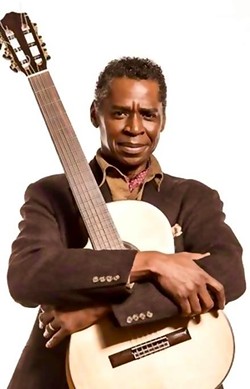
- PHOTO PROVIDED
“It bugs me when people talk about ‘talent,’” Bradley says. “Ellington was ‘talented,’ but people like Oppenheimer were ‘geniuses.’ Mick was a genius. But it’s hard to make it while still being a committed husband, father, grandfather; while still being a good person. He was all that, and it probably kept him from being more successful.”
By some measures, “success” eluded Mick Fambro. But talking to people who knew and admired him, intimately or at a distance, it’s hard to see him as anything but a gift to the world.
If that’s not success, perhaps we need a better definition.
